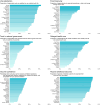Insights on Late-Stage COVID-19 Pandemic Recovery From a 21-Country Online Survey
- PMID: 40226847
- PMCID: PMC11985331
- DOI: 10.3389/ijph.2025.1607601
Insights on Late-Stage COVID-19 Pandemic Recovery From a 21-Country Online Survey
Abstract
Objectives: The widespread impact of the COVID-19 pandemic on health systems, economies, and societies globally requires comprehensive data to guide effective recovery efforts. Online surveys have become crucial for rapid and extensive data collection. The Pandemic Response Survey (PRS), utilizing the Facebook Active User Base (FAUB), assessed the pandemic's population-level impacts across 21 countries, gathering information on healthcare, vaccine confidence, trust, and economic and educational indicators.
Methods: Conducted from March to May 2023, the PRS, translated into 15 languages, used the FAUB for gender-stratified random sampling of adults 18 years and older. The survey collected responses from 621,000 individuals, achieving a completion rate of 43%. Non-response and inverse propensity score weights were applied to calibrate the data to known demographic totals, enhancing the survey's generalizability.
Results: The PRS findings reveal disparities in life satisfaction, food security, delayed healthcare, vaccine confidence, and trust across countries. Life satisfaction was reported as high by 70%-80% of respondents in Egypt, Nigeria, Colombia, and Mexico, while only 20%-30% of respondents in Indonesia, Turkiye, and Viet Nam reported the same. Approximately 50% of respondents in Nigeria, South Africa, and Colombia experienced food insecurity, in contrast to less than 10% in Italy, Japan, and Germany. In Germany, 44% of respondents expressed high vaccine confidence compared to 10.6% in South Africa. Over half of respondents in Indonesia (52.4%) reported that their child was up to date on routine immunisations.
Conclusion: The PRS demonstrates the effectiveness of online surveys in capturing actionable data during a global health crisis. The findings underscore the importance of targeted interventions and policy decisions to address the multifaceted challenges of pandemic recovery. Collaborative efforts in data collection and knowledge sharing between nations with shared profiles may foster more effective strategies.
Keywords: COVID-19 pandemic; health care access; pandemic recovery; survey methodology; vaccine confidence.
Copyright © 2025 Ewald, Bellettiere, Farag, Lee, Palani, Castro, Deen, Gillespie, Huntley, Tracy, Haensch, Kreuter, Weber, Zins, La Motte-Kerr, Li, Stewart, Gakidou and Mokdad.
Conflict of interest statement
Authors JB, TF, KL, and SP were employed by the company Meta. The remaining authors declare that they do not have any conflicts of interest.
Figures



References
-
- WHO Team. Second Round of the National Pulse Survey on Continuity of Essential Health Services during the COVID-19 Pandemic. In: Report No.: WHO/2019-nCoV/EHS_continuity/survey/2021.1 (2021). Available online at: https://www.who.int/publications/i/item/WHO-2019-nCoV-EHS-continuity-sur.... (Accessed May 8, 2024).
MeSH terms
LinkOut - more resources
Full Text Sources
Medical

